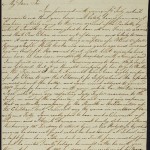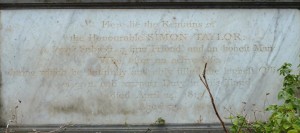Taylor was born in Kingston, the main port and largest town in Jamaica, in 1739. He was educated in Britain and returned to Jamaica in 1760, following the death of his father. On his return to the Caribbean, he began a career as a planter, purchasing sugar plantations, otherwise referred to as ‘estates’, in the eastern Jamaican parish of St Thomas in the East and in the northeastern parish of St Mary’s. Apart from one short trip to England, Taylor lived in Jamaica for the rest of his life after 1760. He died at Port Royal, Jamaica, in 1813, at the age of seventy-four. At his death he was one of the wealthiest men in the British empire, and his massive personal fortune was built on the backs of the enslaved men, women, and children who laboured on the sugar estates and other properties that he owned or managed. He ‘owned’ over 2,000 slaves when he died.

A page from one of Taylor’s many transatlantic letters. Courtesy of the Institute of Commonwealth Studies Library. Click to enlarge.
Taylor wrote from Jamaica to friends, family members, business associates, and political allies in Britain. The letters showcased here were written between the 1770s and Taylor’s death. These were years of uncertainty and change for all the inhabitants of the British Caribbean, enslaved and free. They included rebellions and resistance by enslaved people, hurricanes, drought, disruption to trade, the rise of the British abolition movement, the French and Haitian Revolutions, war between Britain and France, the Second Maroon War, civil rights campaigning by free people of colour, and the abolition of the slave trade. The letters provide insights into aspects of life in Jamaica and the history of the British Atlantic from Taylor’s perspective.
Taylor’s worldview was that of a slaveholder. He perceived Africans as inferior to Europeans and believed that it was his right to treat Africans and their descendants as property, as slaves who he could buy, sell, and put to work as he pleased. He generally saw enslaved people not as human beings but as a source of labour. His comments can make for uncomfortable reading. Nevertheless, his letters are important sources for historical research because of the new light that they can shed on a number of themes, including transformations to empire and slavery during the Age of Revolution at the end of the eighteenth century.
